Croatia Records Jugoton Funk Reveals Hrvatska's Heaviest Grooves
ZAGREB October 23, 2020 - Preserved by Zagreb's Croatia Records, the vast archive of giant Yugoslavian music label Jugoton throws up some incredible surprises on the newly released Croatia Records Jugoton Funk Vol. 1
James Brown, Funkadelic, Sly & The Family Stone, Fela Kuti - when you think of funk music, it's black artists that usually come to mind. Although, not if you're Croatian. One of the country's best-loved (and most missed) musicians, Dino Dvornik, was often referred to as the King Of Croatian Funk - his electro explorations in the genre during the early 90s were so innovative they don't sound out of place on dancefloors today. But, though he here might be known as the king of this style, Dino Dvornik was far from the first to record funk music in Croatia.
Marijan Kašaj - Ideja
One of the highlights of Croatia Records Jugoton Funk Vol. 1. Although a classically trained opera singer, Zagreb's Marijan Kašaj expressed a much more rough vocal style when singing rock music, notably as the frontman of the band Grešnici (The Sinners). This song comes only from a rare 45 single and was composed and arranged by Vladimir Delač
The recently released Croatia Records Jugoton Funk Vol. 1 compilation finally lifts the lid on the largely untold history of homegrown Croatian funk music. Culled from the darkest depths of the gargantuan Croatia Records Jugoton archive in Dubrava, this collection tells a story of ambitious musicians joyfully creating some of the wildest sounds to have ever come from these lands. Effortlessly cool and in many cases very surprising, it is a soundtrack that is perhaps even more relevant on today's world stage than when it was made.
Dalibor Brun - Davni život
Rijeka musician Dalibor Brun explored soul and funk music across three solo albums. This track, from his third, features a wild Hammond solo performed by extremely famous Croatian singer and songwriter Oliver Dragojević. “You can hear some funky tracks in Oliver's own back catalogue, but to find him playing such a wild style as a session musician on Dalibor Brun's track is a very unexpected,” says Dr. Smeđi Šećer. “At the time of these recordings, some of these artists were already well established, so they could afford to collaborate and experiment as they wished.”
“Most of Jugoton's output was pop and folk music,” Croatia Records Jugoton Funk Vol. 1's Dr. Smeđi Šećer tells TCN. Alongside co-compiler, Zagreb's Višeslav Laboš, this Rijeka DJ is part of a small scene of enthusiasts who have been reviving the ex-Yu funk sound over recent years - online, on mixtapes and at niche club nights. “These are mostly very obscure releases. You would have to go looking around secondhand record shops for maybe 10 years to find all of these.”
Igor Savin - Alfa
Son of prominent Croatian conductor, composer and opera director Dragutin Savin (longtime director of the Osijek Opera), Igor Savin is a pianist, vibraphonist, composer, arranger and producer who studied at the Theoretical Department of the Academy of Music in Zagreb. He continued his studies by one of the first Croatian students at the prestigious American College of Contemporary Music Industry Berklee College of Music in Boston where he studied harmony, improvisation and composition. As an eighteen-year-old, he founded his first jazz band. He played piano and vibraphone in symphony, studio and festival orchestras, and in the Big Band of HRT. He is the author of music for numerous films, cartoons, television shows, theatre plays and often used melodies from Balkan folk music to inspire his jazz and contemporary classical pieces. In 1984, he founded the electronic studio of the Vatroslav Lisinski Concert Hall.
Time spent rifling through secondhand shops for old, forgotten and obscure music is a pastime known as digging. A phenomenon popularised since the birth of American hip hop in the 1980s, it has been responsible for turning the music of the past into some of the most-contemporary sounds we hear on today's radio or dancefloors. Over the last four decades, countless soul, R&B and hip hop stars have sampled older music to create chart-topping hits. Digging for vintage sounds has subsequently become a global trade. Obsessives Dr. Smeđi Šećer and Višeslav Laboš are two of the best-informed that search for contemporary-relevant sounds in the back catalogues of Balkan music.
Josipa Lisac - Ležaj od suza
'Ležaj od suza' (A bed of tears) is taken from Croatian megastar Josipa Lisac's classic debut LP 'Dnevnik jedne ljubavi'. It is not the only track on the album which you can hear international funk DJs play in some of the coolest clubs in London, Berlin, Manchester and New York. She is backed here by Jugoton's first prog-rock band, Time, plus the strings and horns section of the HRT Orchestra. The iconic cover art of Lisac's debut album was a photograph taken by Croatian photographer Jozo Ćetković, who also took the photograph of Croatian model Branka Habek which is used to form the cover art of Croatia Records Jugoton Funk Vol. 1
For Croatia Records Jugoton Funk Vol. 1, they've been greatly assisted in their endeavors by Zagreb's Croatia Records. Not always regarded as the hippest supplier of niche sounds like forgotten funk, Croatia Records's careful preservation of the Jugoton back catalogue (which they inherited after the break-up of Yugoslavia), has meant that the entire recorded history of the giant Yugoslav label has been made available not only to album compilers like Smeđi Šećer and Višeslav Laboš, but to all. Over recent years, Croatia Records has embarked on an ambitious project to digitalise the entire Jugoton archive. Containing some 70, 000 music recordings and 14, 000 artifacts, this is no small undertaking.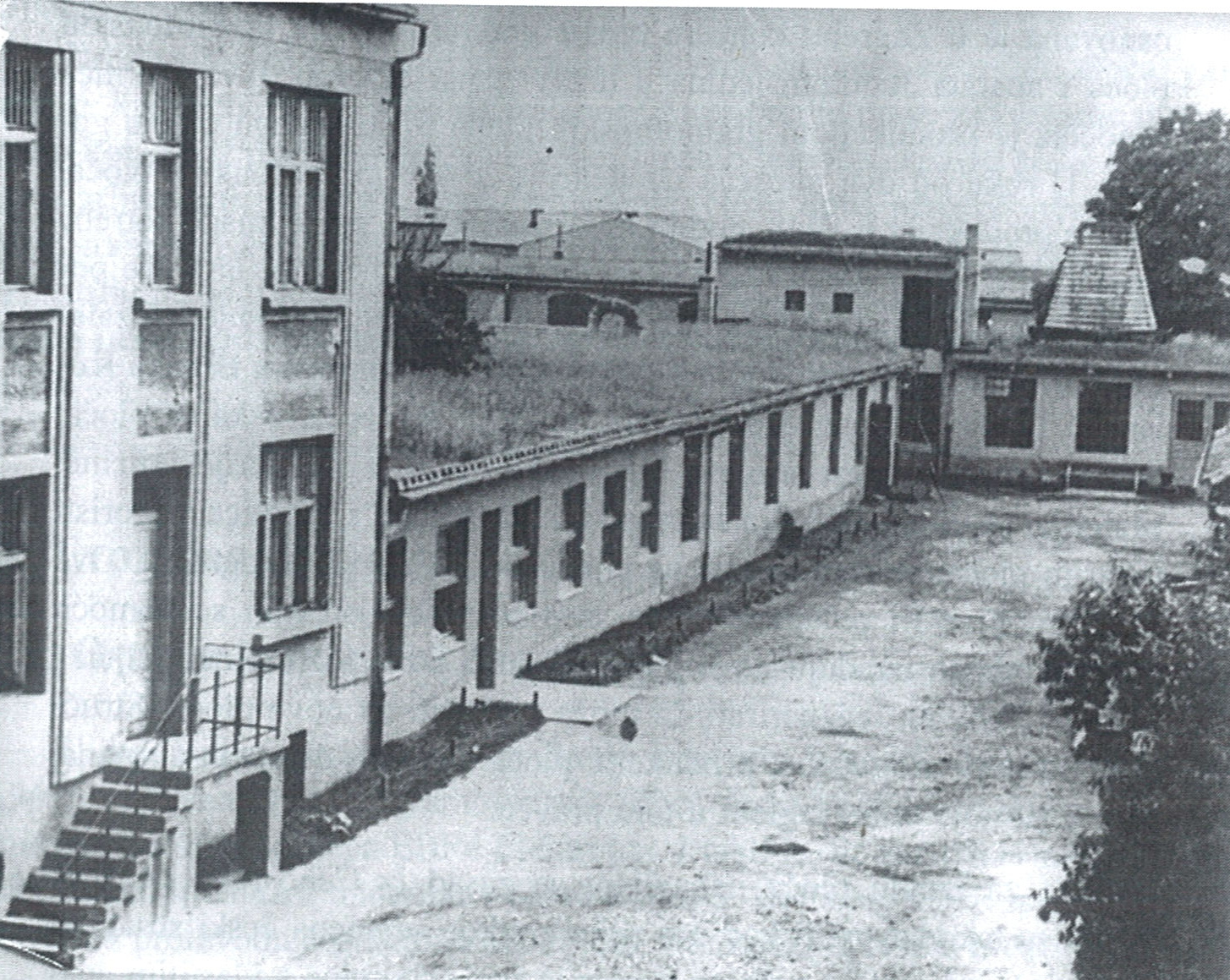 The first Jugoton Records HQ, located at Ilica 213, Zagreb. It subsequently moved to Dubrava, on the site where Croatia Records remains today © Photos from the book History of Vinyl Production in Croatia by Veljko Lipovšćak - provided by Croatia Records
The first Jugoton Records HQ, located at Ilica 213, Zagreb. It subsequently moved to Dubrava, on the site where Croatia Records remains today © Photos from the book History of Vinyl Production in Croatia by Veljko Lipovšćak - provided by Croatia Records
Of all the companies that issued music in the former Yugoslavia, Jugoton was the largest. Based in Dubrava, Zagreb, Jugoton was much more than the type of record label we know today - theirs was an entire industry of culture. Jugoton traces its roots all the way back to the 1930s when it began life as the Elektroton label. After the Second World War, the label was nationalized and renamed Jugoton.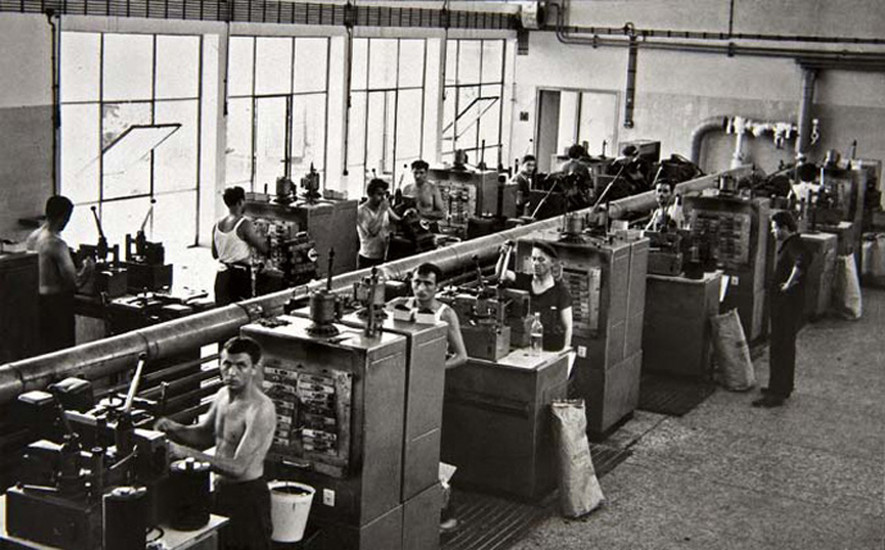
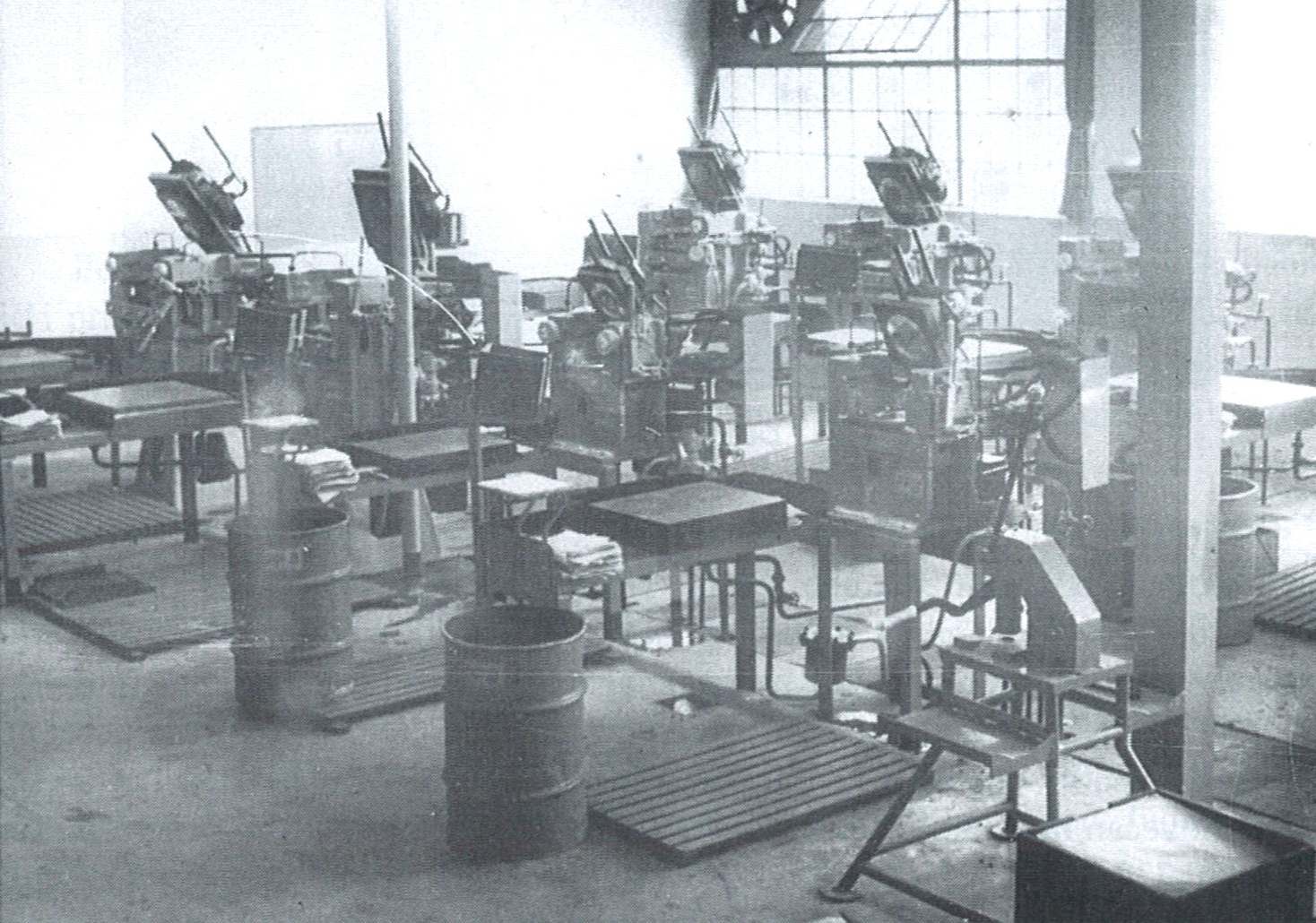 In the two photos above, we can see the Jugoton vinyl pressing factory at two different stages of its evolution © Photos from the book History of Vinyl Production in Croatia by Veljko Lipovšćak - provided by Croatia Records
In the two photos above, we can see the Jugoton vinyl pressing factory at two different stages of its evolution © Photos from the book History of Vinyl Production in Croatia by Veljko Lipovšćak - provided by Croatia Records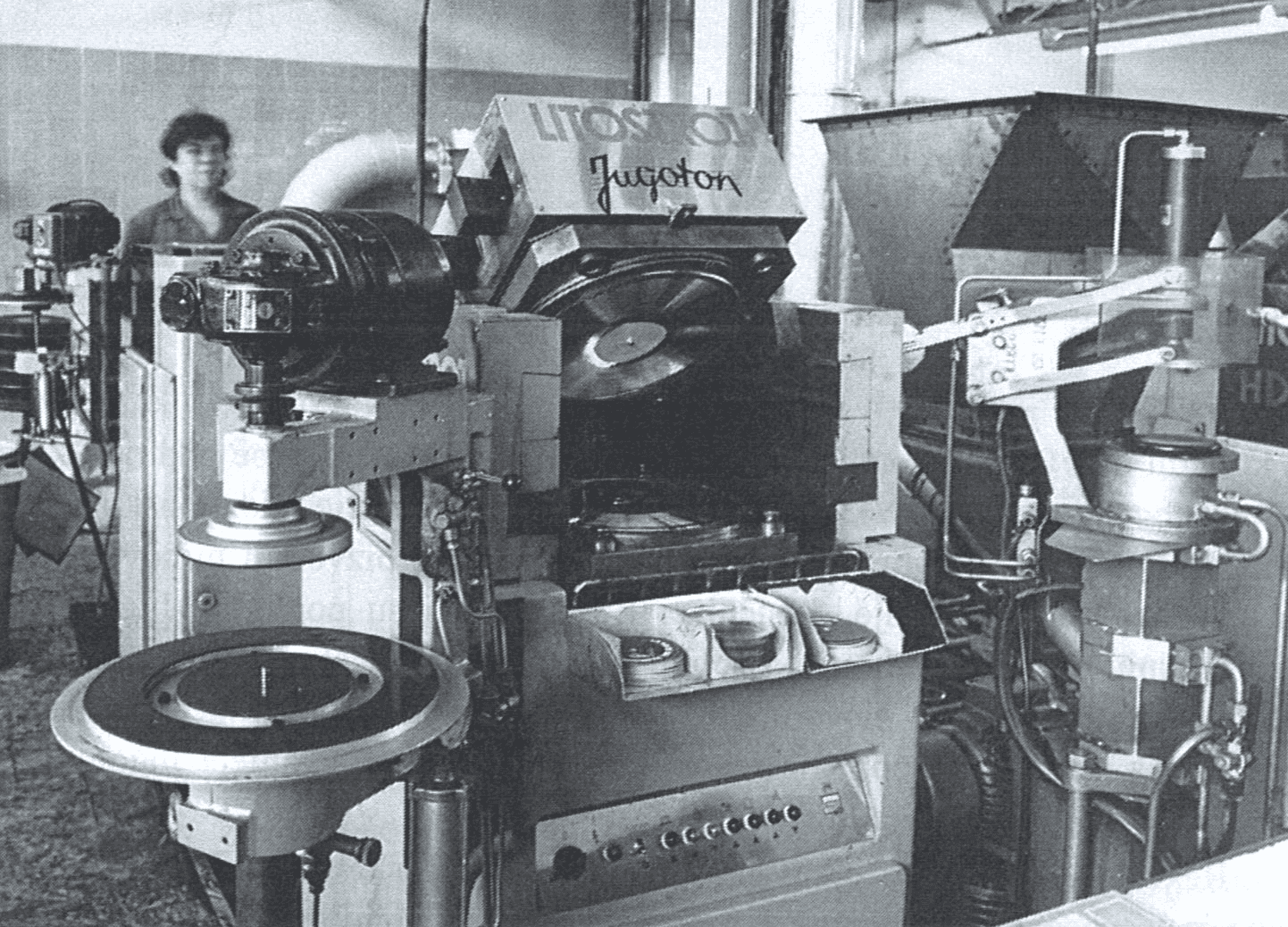 The hydraulic semi-automatic vinyl pressing machine 'Litostroj' at the Jugoton pressing plant 1967 - 1979 © From the book History of Vinyl Production in Croatia by Veljko Lipovšćak - provided by Croatia Records
The hydraulic semi-automatic vinyl pressing machine 'Litostroj' at the Jugoton pressing plant 1967 - 1979 © From the book History of Vinyl Production in Croatia by Veljko Lipovšćak - provided by Croatia Records
At the peak of its influence, Zagreb's Jugoton did more than just sign artists and release music. On the Dubrava site where Croatia Records now stands was a then ultra-modern production studio where famous artists from all over Yugoslavia would come and record. Jugoton made its own discs – at its peak, Jugoton's pressing plant churned out 30, 000 vinyl records every day. By 1982, its decade-old cassette production line made 20,000 units per day. They also owned the largest chain of music stores within the country. As well as the domestic artists signed to Jugoton, the label licensed and released music by some of the biggest artists of the day, including Elvis Presley, The Beatles, The Rolling Stones, Deep Purple and Pink Floyd. Its audience was the 20 million+ inhabitants of Yugoslavia.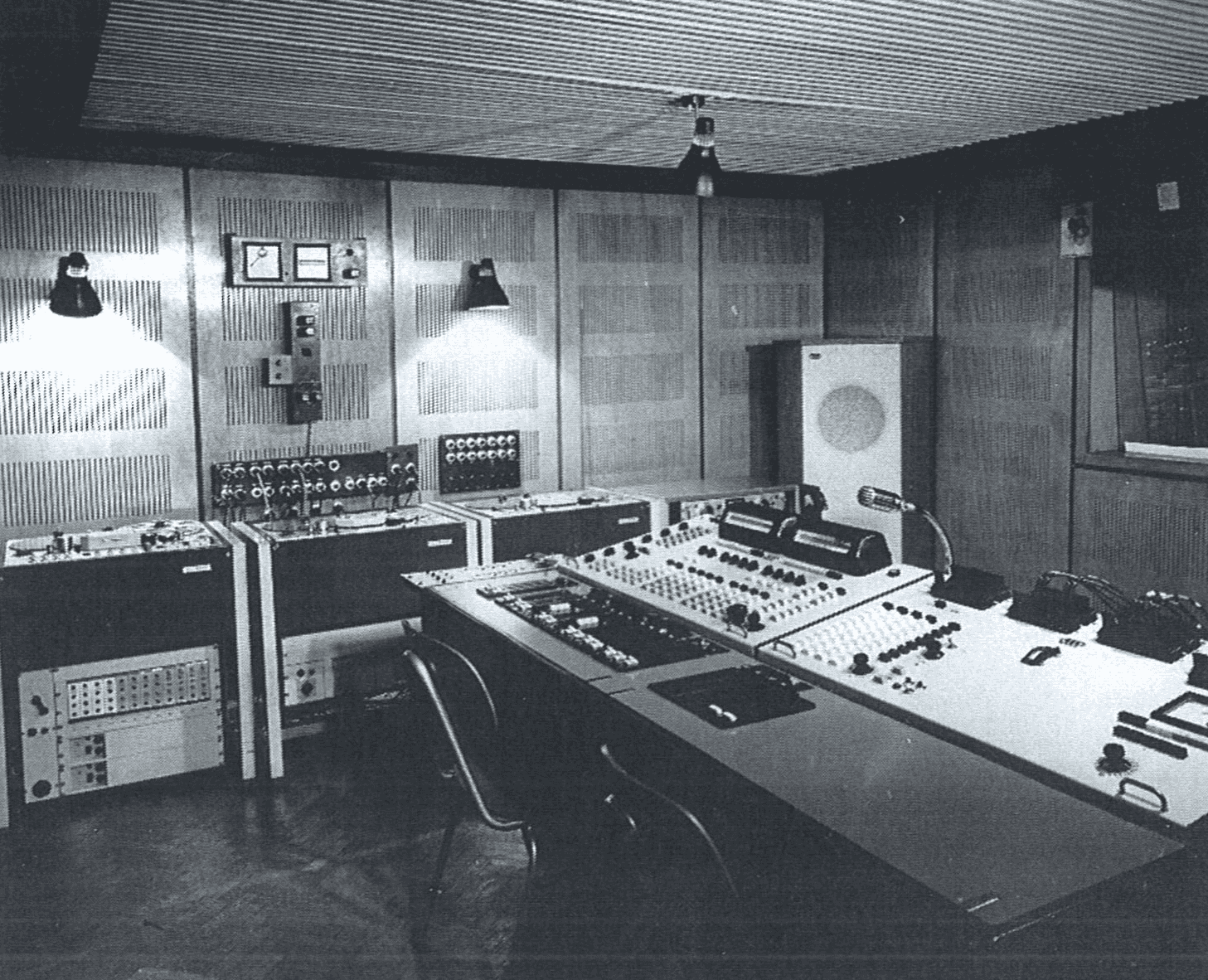 Part of the Jugoton studio set up on the Dubrava site. This specific equipment was in use between 1964 and 1975 © From the book History of Vinyl Production in Croatia by Veljko Lipovšćak - provided by Croatia Records
Part of the Jugoton studio set up on the Dubrava site. This specific equipment was in use between 1964 and 1975 © From the book History of Vinyl Production in Croatia by Veljko Lipovšćak - provided by Croatia Records
Though the music contained in Croatia Records Jugoton Funk Vol. 1 does not sound immediately like the folk and pop music we associate with the label, considering the size of the Croatia Records Jugoton archive it is perhaps less surprising that such anomalies can be found.
“Western music always had a strong appeal in Yugoslavia,” says Dr. Smeđi Šećer. “At the beginning of the communist regime, there was a strong implementation of censorship. But, in the 1960s the (communist) party seemed to relax and allow some western influences through. From this decade, a lot of cover versions of western artists started to be recorded by Yugoslavian singers. Yugoslavian labels would officially license western music and release it here. For instance, you can find releases by Ray Charles on the PGP-RTB label out of Belgrade from the early 1960s. All of this started to influence the music made here. Arsen Dedić, for example, recorded the first Yugoslavian bossa nova record in 1963.”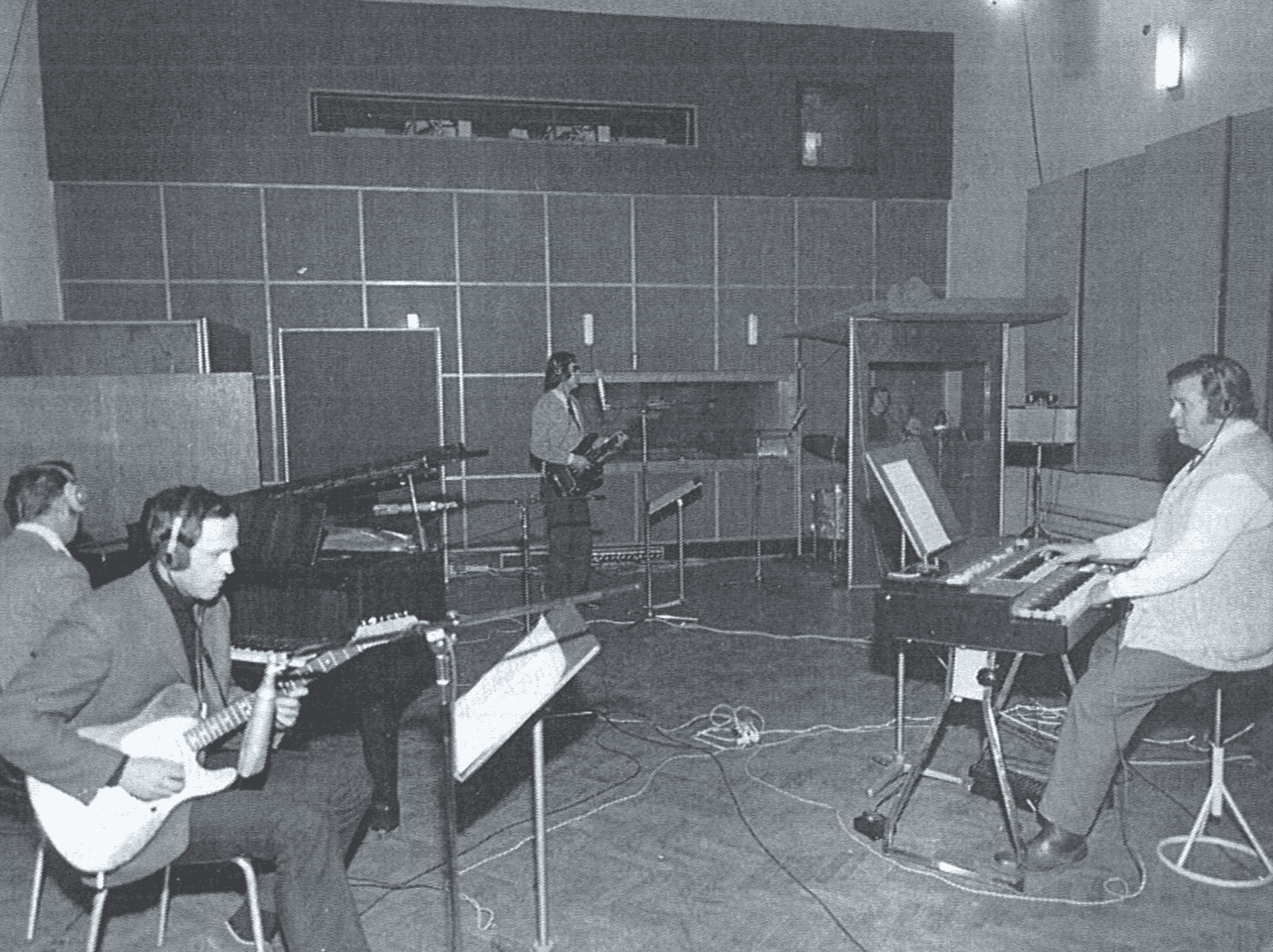 Zagreb musicians pictured at the small sound hall at Jadran film © From the book History of Vinyl Production in Croatia by Veljko Lipovšćak - provided by Croatia Records
Zagreb musicians pictured at the small sound hall at Jadran film © From the book History of Vinyl Production in Croatia by Veljko Lipovšćak - provided by Croatia Records
“The funk sound from here can be really interesting - quite unique. While some bands did try to record this black American music in exactly the style as the Americans did it, many artists from here enjoyed experimenting with the style - in particular some pop artists and progressive rock bands. They took the rhythm and the funk from the American music, but added their own styles – sometimes distinctly Balkan styles – over the top. Boki Milošević and the Belgrade Jazz Orchestra spring to mind immediately.”
Zdravko Čolić - Mujo kuje konja po mjesecu
A giant of Yugoslavian music, Zdravko Čolić's inclusion on Croatia Records Jugoton Funk Vol. 1 is one of the most unusual (and rarest) pieces of music in his back catalogue. It is a funk version of the Bosnian sevdah classic 'Mujo kuje konja po mjesecu (Mujo changes the horseshoe by the moonlight)'. “This is from an extremely rare compilation of pop festival music,” says Dr. Smeđi Šećer. “It's not something you'd come across every day. It was shown to me by a Slovenian DJ colleague. I only ever saw a physical copy of this release maybe two or three times in all my years spent digging.”
The world's largest exporter of music is the United States. The second-largest is the United Kingdom. That these two largest exporters share a common language – and it being one of the world's most widely spoken – is no coincidence. It can be difficult to export music from Croatia and other Balkan nations purely because of the language barrier. People like to understand the text of what they are listening to. Such barriers can be overcome with overtly emotional delivery, such as in the case of folk music like sevdah, but also when the musical style is something relevant to the dancefloor. Especially within a niche international scene like rare funk.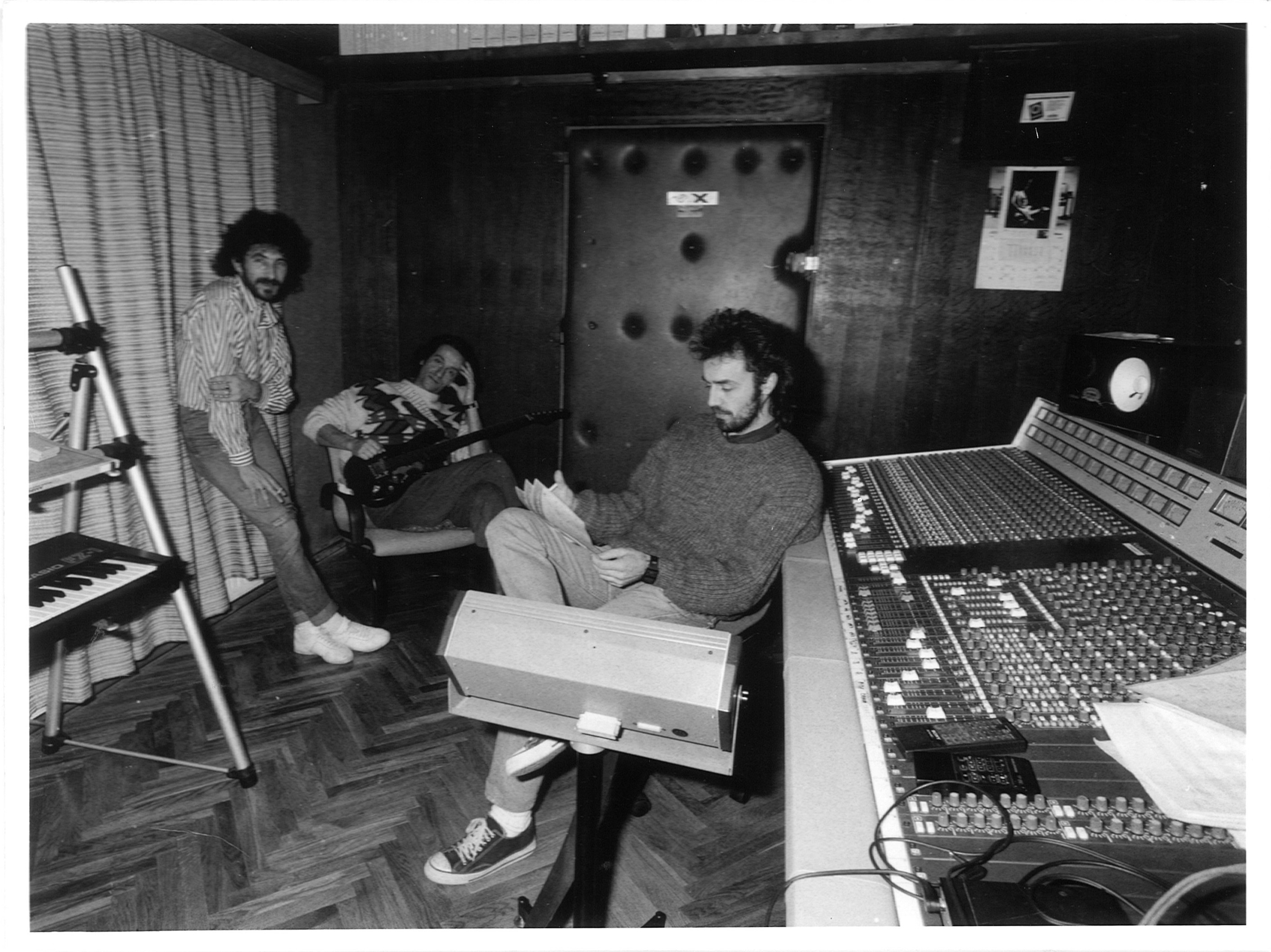 Even after the label stopped being Jugoton and became Croatia Records, famous artists from all the former countries of Yugoslavia would still come to work at the recording studios in Dubrava. In this photo from the early 1990s we see (left to right) Croatian singer Željko Bebek from the Sarajevo-formed Yugoslavian rock giants Bijelo Dugme, Macedonian guitar virtuoso Vlatko Stefanovski from the band Leb i sol and Bosnian singer, guitarist, arranger and producer Nikša Bratoš from the band Crvena Jabuka. Bijelo Dugme was the most popular and best-selling rock band from Yugoslavia. Their first recordings were offered to record label Diskoton in their native Sarajevo. They were turned down, allegedly as the label's release schedule was already full for the following six months. This is widely considered the greatest business mistake in the history of Yugoslav record publishing. On the same day as this refusal, Zagreb's Jugoton snapped the band up for an initial five-year contract © Photo from the Croatia Records archive and licensed for exclusive use within this article by Croatia Records
Even after the label stopped being Jugoton and became Croatia Records, famous artists from all the former countries of Yugoslavia would still come to work at the recording studios in Dubrava. In this photo from the early 1990s we see (left to right) Croatian singer Željko Bebek from the Sarajevo-formed Yugoslavian rock giants Bijelo Dugme, Macedonian guitar virtuoso Vlatko Stefanovski from the band Leb i sol and Bosnian singer, guitarist, arranger and producer Nikša Bratoš from the band Crvena Jabuka. Bijelo Dugme was the most popular and best-selling rock band from Yugoslavia. Their first recordings were offered to record label Diskoton in their native Sarajevo. They were turned down, allegedly as the label's release schedule was already full for the following six months. This is widely considered the greatest business mistake in the history of Yugoslav record publishing. On the same day as this refusal, Zagreb's Jugoton snapped the band up for an initial five-year contract © Photo from the Croatia Records archive and licensed for exclusive use within this article by Croatia Records
“Quite a few of these records are well known among connoisseur collectors outside of ex-Yu countries and they have a high price,” says Dr. Smeđi Šećer. “You can find Yugoslavian funk included on mixtapes by rare funk and hip hop collector DJs from all over the world. I know of one mixtape made by a well-known DJ from New York which uses only music released in the former Yugoslavia. And why shouldn't that be the case? This is the era we live in. You can go out in Zagreb and hear a Croatian DJ play Peruvian psychedelic cumbia music or afrofunk, so there are definitely DJs in the UK, the USA - maybe even Peru - who will play Yugoslavian funk. It's just feel-good dancefloor music that transcends all boundaries.”
The digital and CD version of Croatia Records Jugoton Funk Vol. will be released shortly by Croatia Records. The extravagantly designed double vinyl album version is out now and was released under license by specialist Dutch vinyl company Everland Music. The last vinyl album produced by Jugoton’s vinyl pressing plant in Croatia was a disc containing the sermons of Pope John Paul II
For the latest travel info, bookmark our main travel info article, which is updated daily.
Read the Croatian Travel Update in your language - now available in 24 languages.
Zagreb Advent 2020: Smaller Edition will Expand to Neighborhoods
October 23, 2020 - Given the epidemiological situation around Europe at the moment, it's hard to imagine any Christmas markets will be held this year at all. Here's the latest on Zagreb Advent 2020.
Vecernji List reported on Thursday that Zagreb Advent would be organized by Zagreb Markets (Tržnice Zagreb) and, according to the latest, the Zagreb Fair (Zagrebački velesajam).
In recent days, media speculation about the organization of the capital's biggest event has been mixed. But for now, the City administration is certain that Advent will be held, albeit on a smaller scale than previous editions. How exactly it will look, i.e., how many caterers will be allowed in certain locations and how the food will be served, is still to be decided.
"We only started discussing this topic two days ago; we will define the details at the working meetings. Advent will not be able to be at the level of previous years because there are fewer tourist arrivals and travel in general," said Mirka Jozic, head of the Office of Economy. At the meetings, it was agreed that the caterers would disperse, so Advent will be in the city center and the neighborhoods and allow counties to participate by exhibiting their souvenirs.
"The main attraction will be the area around the cable car, where caterers will also offer their products," said the City. They also note that Zagreb Fair will be in charge of the organization, allocating houses and catering, in cooperation with the Zagreb Caterers' Association and the Independent Association of Caterers, and Zagreb Markets will take over the logistics.
"We also demanded that anyone who is not a caterer be eliminated from renting houses or stalls. This should be solved by determining special coefficients based on the number of employees, income, and turnover of individual caterers," said Marin Medak, who has participated in Advent so far and is also a representative of the profession in meetings with the city administration.
Medak believes they could have an outline of the Advent organization by the end of the week. As for the allocation of houses, the caterers ask for a special committee to decide on it, including someone from the City, the catering sector, and. the Chamber of Crafts.
If the decision is passed by the Assembly, the procedure for allocating public space will be carried out by a special commission that will have a president and four members and their deputies. Locations will be awarded through a public tender, the commission will consider the received bids, and then the most favorable will be determined and submitted to the mayor.
The most favorable bid in the public tender procedure for setting up houses is a bid that meets the conditions of the public tender and contains the highest offered amount of a one-time location fee," explains the decision that took place last summer.
A returning tenant will have the right to take advantage of the tender, but one company will not rent more than 40 percent of public space. However, locations will be allocated directly, without a public tender, if there are vacancies after the tender. The commission will also decide who will get the location directly, i.e., they will propose candidates to the mayor.
As for the organization of cultural events, for which the Zagreb Tourist Board is in charge, they will take place following the National Headquarters' recommendations, whose measures are still awaited.
"We are in constant contact with them, and we are waiting for the decision of the Assembly, so we will know in which direction everything will go. So far, we have several framework scenarios, and we will hone the detail," said the Zagreb Tourist Board.
To read more about lifestyle in Croatia, follow TCN's dedicated page.
Flights to Croatia: LOT Operates to Zagreb in November, Dubrovnik Service Canceled
October 23, 2020 - The latest news for flights to Croatia as LOT operates to Zagreb in November and cancels its Dubrovnik service.
Croatian Aviation reports that Polish national airline LOT has announced its flight schedule for November this year. Compared to last year, the company will operate only to Zagreb, and the line to Dubrovnik has been canceled for this year's winter flight schedule.
This summer, LOT Polish Airlines operated on numerous routes from Warsaw and other Polish cities to destinations in Croatia (Zagreb, Rijeka, Zadar, Split, Dubrovnik). Despite the corona crisis, more than 13 new lines have been introduced. Croatia was extremely accessible to Polish tourists by air bridges in this crisis summer season, which is confirmed by the number of arrivals of Polish tourists in the Republic of Croatia this year.
LOT returned to Croatia on July 1, and this summer, it operated on a larger number of routes compared to the summer flight schedule of the previous year.
In the winter flight schedule, which will take effect soon, LOT will keep only one active line to Croatia. Namely, the company plans to operate on the line between Warsaw - Zagreb. Four flights a week have been announced every Monday, Wednesday, Friday, and Saturday. E170 aircraft with a capacity of 70 passengers will operate on the route.
Flights on Wednesdays and Fridays will operate in the morning, while flights on Mondays and Saturdays are announced in the afternoon and evening, respectively.
Although LOT also operated on the Warsaw - Dubrovnik line last winter, this will not happen this winter. Due to the impact of the global pandemic and weak demand, the company has temporarily discontinued this line and plans to operate on it from the spring of next year.
As confirmed to Croatian Aviation from this airline, LOT plans to operate next summer on all routes on which it operated this summer (only the Warsaw - Rijeka route is in question). Still, the decision on the realization of these flights will depend primarily on travel restrictions and demand itself.
Until the spring of next year, LOT will operate regularly only to Zagreb, to a much lesser extent compared to last year's winter flight schedule.
For the latest travel info, bookmark our main travel info article, which is updated daily.
Read the Croatian Travel Update in your language - now available in 24 languages.
Flights to Croatia: Windrose Announces an Additional Weekly Flight to Zagreb
October 22, 2020 - The latest news for flights to Croatia as Windrose announces an additional weekly flight to Zagreb.
Croatian Aviation reports that less than a month after the launch of the Kyiv-Zagreb route, Windrose Airlines decided to increase the number of weekly flights on the route to Zagreb. In addition to flights on Wednesdays and Sundays, the company will operate on this route from December on Fridays!
Windrose Airlines launched the Kyiv - Zagreb route on October 4 this year, a little less than a month ago. Due to excellent occupancy and high demand, the company will add another flight per week on this route in December.
As confirmed to Croatian Aviation by this airline, which also operates to other airports in Croatia (Pula, Split, and Dubrovnik) in the summer flight schedule, the occupancy of aircraft to and from Zagreb is excellent, which consequently led to the decision to increase the number of weekly flights to this line.
In the first three weeks of operation, almost 600 passengers traveled on this line, which gives an average Load Factor (passenger cabin occupancy) of a high 82%.
Windrose Airlines planned to operate ERJ145 aircraft on the route, which has a capacity of only 48 seats in the fleet of this carrier, but all Sunday flights operate on aircraft of higher capacity, ATR75 (72 seats).
During the pandemic, especially when the numbers of infected are rising again across Europe and the world, Windrose Airlines has excellent results on this newly established route between the capitals of Croatia and Ukraine.
Unlike flights on Wednesdays and Sundays, the additional flight on Fridays will operate in the morning:
Kiev 07:40 - 08:50 Zagreb 09:35 - Kiev 12:30
On the additional rotation on Friday, ERJ145 aircraft was announced.
For the latest travel info, bookmark our main travel info article, which is updated daily.
Read the Croatian Travel Update in your language - now available in 24 languages.
Flights to Croatia: Air France Operates Five Times A Week to Zagreb in November
October 20, 2020 - The latest news for flights to Croatia as Air France operates five times a week to Zagreb in November from Paris. A look at the winter schedule.
Croatian Aviation reports that in the announcement of the winter flight schedule, on October 2, Air France announced daily flights on the Paris - Zagreb route. The company has reduced the number of weekly flights on this route for November.
Air France returned to Zagreb on July 1 and has since operated regularly between Paris and Zagreb, changing the number of weekly flights on this route from month to month, depending on demand and travel restrictions between the two countries.
In the first week of October, the company announced daily flights on this route in the winter months ahead, but in the last week of October, from October 26 to 31, the company will operate between Paris and Zagreb three times a week (Tuesdays, Fridays and Saturdays), as announced earlier.
From November 1, Air France offers five flights a week on this route, every day except Tuesdays and Sundays, which provides passengers from Zagreb with a large number of connections via Paris to further destinations in Europe and the world.
Terminals 2E, 2F and 2AC are currently in operation at Charles de Gaulle Airport, from which all domestic and international traffic takes place. The airport will put the other terminals back into operation as needed, following an increase in aircraft and passenger operations.
In November, E190 aircraft with a capacity of 100 passengers in the fleet of this carrier will operate on the Paris - Zagreb route. Five flights a week is currently a satisfactory weekly frequency that allows passengers from Zagreb with one stop in Paris to continue their journey to more than a hundred destinations across Europe and the world.
For the latest travel info, bookmark our main travel info article, which is updated daily.
Read the Croatian Travel Update in your language - now available in 24 languages.
Korlat Presented its Newest Wine Gems in Zagreb
October 18, 2020 - In a terrific atmosphere of the one of the best, and most certainly most beautiful fine dining restaurants in Zagreb, Zinfandel’s at hotel Esplanade - Badel organized a very exclusive event, even more exclusive due to the pandemic regulations.
The theme of the event was the presentation of its premium line of wines under the famous Korlat label. Many exclusively picked eminent guests and respected wine connoiseurs gathered there to taste and enjoy the wines. The prominent guests included very well known chefs Marin Medak and Bruno Vokal; restaurant owner Danijela Gajski; journalists and wine experts Domagoj Jakopović Ribafish, Rene Bakalović, and numerous experienced sommeliers. The new ambassadors of Korlat 2016 were also present: Mirela Kardašević, chef David Skoko and famous Croatian musician Ivan Dečak.
The vintages that were tasted were Korlat Merlot 2016, Korlat Cabernet Sauvignon 2016, Korlat Syrah 2016, and a new wine from the Superior selection - Korlat Supreme Cuvee 2013 (made of Cabernet Sauvignon, Syrah and Merlot). After few opening words from the marketing director of Badel 1862 Vanja Bartolec, Vezak Sauvignon 2019 was served, a wine that everybody involved is very proud of, just as the wine serverd at the very end of the evening: dessert wine Korlat Merlot Boutique 2017.
In more senses than one, it was truly a night to remember, not only beacause of the wines, but just as much due to the food served - that was imaginative, fresh and super tasty. It was to be expected from the great chef Ana Grgić of Espanade, who simpy - never disapointes.
Ana Grić was helped by Badel chief enologist Dubravko Ćuk in order to perfectly pair each wine with the dishes served. Ćuk personally presented every wine, while young Croatian singer Lu Jakelić was in charge of the musical background, and an exciting performance appriciated by the audience.
It is also important to take a lok back and mention that top quality red wines by Korlat have been presented for the first time with the 2007 vintage, and ever since then - have beeen evolving as an unavoidable presence among the very best premium Croatian wines. They have been awarded numerous Croatian and international awards, among which Red Dot Award is one of the more important ones. It is also important to say that Koralt labeled wines come from within the best places inside the vineyards situated on the best possible positions. The newest gem, Korlat Supreme Cuvee 2013 is the best proof that the whole concept and the strategy actually work.
To read more about lifestyle in Croatia, follow TCN's dedicated page.
St. Catherine's Specialty Hospital First in Croatia with Quick COVID Testing, Results in 15-30 Minutes
October 18, 2020 - St. Catherine's Specialty Hospital is the first in Croatia to provide quick testing for COVID-19, which gives results in 15 to 30 minutes.
HRTurizam reports that the SARS-CoV-2 antigen test is an extremely valuable diagnostic test with high specificity (99.68%) and enters the family of tests performed in direct contact with the patient and for which results are obtained shortly after testing.
What is crucial and a game-changer, especially for the entire tourism sector, is that test results are obtained within 15 to 30 minutes.
Jadranka Primorac, St. Catherine's Specialty Hospital: Rapid testing was done to relieve the entire health system
Due to the high pressure on the entire health system, rapid testing that gives results in 30 minutes or less, depending on the number of simultaneous tests and the number of professional staff, will improve the overall situation and the pressure on health facilities.
“Rapid testing was done with this goal in mind, for emergency diagnosis and triage to relieve the entire health system, it is also suitable for people who have been in contact with an infected person or have clinical symptoms. It is a test of the pharmaceutical company Roche, which put the test on the market at the end of September," points out Jadranka Primorac, member of the Management Board, and adds that testing is also good for quickly testing tourists at airports.
The test price is 350 kuna, and Primorac adds that a quick COVID-19 test is done at St. Catherine's in Zagreb, in a separate unit, following all security protocols.
"We are also provided with access to the National Database so that in case of a positive test, we can enter all positive patients in the SARS-CoV-2 database," emphasizes Jadranka Primorac.
When we talk about the tourism sector, fast testing is certainly suitable for airports and all passengers who want to get tested quickly and have a negative test, which is an obligation to enter most countries.
The St. Catherine's points out that the prices of the tests are 350 kuna, and for all inquiries about the tests, you can contact them HERE.
By the way, this is a product of the pharmaceutical company Roche, the Elecsys® SARS-CoV-2 Antigen test, which according to official information from the Roche website, is a very accurate laboratory immunological test for in vitro qualitative detection of the nucleocapsid antigen SARS-CoV-2.
“We are aware that governments and health systems are under great pressure to increase the ability to test for SARS-CoV-2 to manage the spread of the virus effectively. The high-volume antigen test is a valuable addition to the portfolio to help diagnose SARS-CoV-2. The ability to quickly and correctly determine if someone has SARS-CoV-2 is crucial to inform patient management decisions and to combat the spread of COVID-19. Roche remains committed to supporting governments, healthcare professionals, and patients in the fight against this pandemic with the help of our diagnostic solutions," said Thomas Schinecker, CEO of Roche Diagnostics.
Immunological test Elecsys SARS-CoV-2 Antigen works on all immunochemical analyzers that are widely available worldwide. These fully automated systems can provide test results in about 18 minutes for a single test (excluding sample collection, transport, and preparation time), with up to 300 tests per hour from a single analyzer. The aforementioned laboratory-automated antigen test allows for reduced costs and errors due to the removal of manual handling, as well as fast turnover and high throughput, according to official Roche information.
Rapid testing is a major challenge for the global recovery of tourism and a key element for air traffic activation.
Regarding the standardization of security protocols and the introduction of contactless thermal camera technology at airports, final negotiations are already underway under the auspices of the International Air Transport Association (IATA), and it is a matter of months, if not weeks when they will be agreed. On the other hand, a couple of global companies from the USA and Israel have also released quick tests for COVID-19, and now Roche has joined them.
What is certain is that rapid testing will be made possible globally in the coming months, which is important for the tourism sector.
To read more about lifestyle in Croatia, follow TCN's dedicated page.
Zagreb Advent 2020 is Uncertain, Says Tourist Board
October 17, 2020 - Zagreb tourism is suffering considerable losses due to the coronavirus pandemic and the consequences of the earthquake back in March. Tourist arrivals and overnight stays are around 30 percent of last year, and Zagreb Advent 2020 is uncertain, the Zagreb Tourist Board revealed.
"Conditions and possibilities of holding certain events have changed significantly this year, even for those outdoors in the autumn and wintertime. We are currently completing preparations for several autumn projects through which Zagreb will once again be confirmed as the most important cultural and tourist destination in Croatia. We are also developing possible scenarios for Advent," said Martina Bienenfeld, director of the Zagreb Tourist Board, as reported by Index.hr.
She emphasizes that health and safety are taken into account first, and then everything else that makes up a particular event.
"We are in contact with the competent authorities of the City of Zagreb, the national and city civil protection headquarters. We are working on measures and organization, and if it takes place, we will respect and insist on all the guidelines that will be recommended," says Bienenfeld.
She also commented on the recently published list of the 15 safest Christmas destinations in Europe by the European Best Destinations (EBD), in which Zagreb is in 8th place. They also mention the date of this year's Advent (from November 27, 2020, to January 3, 2021), though the Tourist Board emphasizes they did not participate in this or communicate anything to the EBD, not even the dates they stated.
"EBD has been promoting sustainable European tourism for years in collaboration with the European Commission and other institutions and has compiled the list according to its own criteria, which, according to explanations we received from its director, were the number of cases per million inhabitants and hospital beds per capita, proximity to airports, the establishment of sanitary measures and others. According to the online voting in the EBD organization, Zagreb Advent was named the best in Europe three times. Croatia was among the countries with a relatively favorable epidemiological picture in September. Logically, they took us into account, and it is certainly positive that we are on that list," says Bienenfeld.
Presenting data on the decline in physical tourist traffic for the first nine months of this year, she notes that this is expected and points out the increased average length of stay of tourists in Zagreb, to 2.21 nights, compared to last year's 1.83.
By the end of September this year, almost 283 thousand tourists came to Zagreb, who realized 624.3 thousand overnight stays, or 26 and 31 percent of last year's results. Most tourists were from Croatia, followed by Germany, Italy, Bosnia, and Herzegovina, and Poland, while, in addition to locals and tourists from Germany, most overnight stays were achieved by tourists from Italy, Bosnia and Herzegovina, and the USA.
In the first 15 days of October, 15.7 thousand tourists visited or 22 percent of last year's number in the same days, while 33 percent was reached with just over 41 thousand overnight stays, with a further extension of the average stay to 2.61 nights.
Most tourists stay in hotels, about 50 percent, then in private accommodation - about 40 percent. Bienenfeld reveals that due to the pandemic and the aftermath of the earthquake, seven hotels and 11 hostels are currently operating in Zagreb, and about 135 private accommodations closed just because of the earthquake.
Due to the damage caused by the earthquake, 15 museums and seven galleries and art collections are currently closed, which significantly reduces the offer. She also points out that changes in the behavior of those who travel are noticeable in the pandemic.
"Individual and smaller family and business trips have completely prevailed in Zagreb. Tourists are favoring individual rather than group city tours, visiting Zagreb attractions on their own, and spending more time outdoors and exploring the Zagreb area, which is thanks to our first destination campaign in cooperation with the Zagreb County Tourist Board "Near the city, close to the heart," says the director of the Zagreb Tourist Board.
Because of the coronavirus situation, the Zagreb Tourist Board changed the work program for this year and reduced expenditures by 35 percent, primarily the cost for promotional activities, appearances at fairs and international workshops, event support, materials and souvenirs, and offline advertising, and reduced the number of employees to five people.
"Circumstances have changed significantly, and existing employees are engaged in jobs caused by pandemics and earthquakes that do not represent an additional financial burden. We developed four promotional campaigns from March to October, organized 'hybrid' activities with live broadcasts on our online channels. We also do online presentations and marketing projects for further positioning in the international market, as well as virtual meetings and workshops in targeted markets from which we expect the return of guests as soon as the situation is more favorable," says Bienenfeld.
She believes that careful planning is now needed, with quick and ad hoc reactions and flexibility in decision-making, and, like others in tourism, estimates 2021 as uncertain, emphasizing that everything will depend on the situation and they will need to further adapt and innovate in all spheres of tourist activity.
"The focus should be on sustainable tourism through an adequate strategy for the development of health aspects of staying in the destination, and more than ever, cooperation, support and mutual trust of all tourism stakeholders are needed, especially since it is estimated that there will be no normalization before 2022. Given the importance and share of tourism in GDP, both in Europe and Croatia, it is imperative in these difficult times to encourage the creation of joint solutions by all levels of government to get out of this crisis," Bienenfeld concludes.
For the latest travel info, bookmark our main travel info article, which is updated daily.
Read the Croatian Travel Update in your language - now available in 24 languages.
Flights to Croatia: KLM Operates to Zagreb Daily in November
October 16, 2020 - The latest news for flights to Croatia as KLM operates to Zagreb daily in November.
Croatian Aviation reports that Dutch airline KLM is offering daily flights between Amsterdam and Zagreb until the end of November this year.
KLM has so far canceled several flights on the Amsterdam - Zagreb route in October, and only one departure has been canceled by the end of this month (Wednesday, October 28).
The company plans to operate daily on this line in November, with E190 aircraft, with a capacity of 100 passengers. The daily direct connection between Zagreb and Amsterdam is extremely important, primarily because it is possible to continue the journey through Amsterdam to a number of European and world destinations.
After the cancellation of the Zagreb - Dublin Croatia Airlines route, the daily KLM flight to Zagreb is good news for passengers from Dublin, considering that it is possible to have a very good connection to Zagreb via Amsterdam.
Croatia Airlines will also operate on this route every day, so Zagreb will be connected to the capital of the Netherlands twice a day, so the number of seats offered on this route on a weekly basis is more than satisfactory.
It remains to be seen whether KLM will cancel certain departures in November, and it will certainly depend on the scale of the global pandemic and the status of reservations. KLM has so far been regular on the route to Zagreb and a very small percentage of announced flights have been canceled.
The second KLM line in Croatia, between Amsterdam and Split, operates seasonally and will end this year at the end of October. The last flight this year on the Amsterdam - Split route has been announced for Saturday, October 24, when this year's summer flight schedule ends.
For the latest travel info, bookmark our main travel info article, which is updated daily.
Read the Croatian Travel Update in your language - now available in 24 languages.
Flights to Croatia: Turkish Airlines Operates to Zagreb 4 Times a Week in November
October 15, 2020 - The latest news for flights to Croatia as Turkish Airlines operates to Zagreb four times a week in November.
Croatian Aviation reports that Turkish Airlines plans to operate on the Istanbul - Zagreb route four times a week in November this year. The company operates regularly to Zagreb, without canceling the announced flights.
The Turkish national airline, a company that normally operates to the most destinations in the world (over 315), plans to operate four times a week on the Istanbul - Zagreb route in November this year.
It is, of course, a smaller number of weekly flights compared to last year's winter flight schedule (10 to 14 flights a week), but given the global pandemic and reduced demand, this move is not really surprising. The company also operated four times a week in the summer flight schedule to Zagreb (twice a day last year) and the same number of weekly operations was announced for the first month of this year's winter flight schedule.
Turkish Airlines has direct flights on Mondays, Wednesdays, Fridays, and Sundays. Flights fly on Mondays and Fridays in the evening, while flights are on Wednesdays and Sundays in the morning.
Given the fact that entry into Turkey is possible without a COVID-19 test, and there are currently very favorable prices for return tickets on the Turkish Airlines route from Zagreb to Istanbul, a large number of Croatians decided to travel to this destination at this time, so the occupancy of this company's aircraft on the only route to Croatia is very good.
The second destination of Turkish Airlines in Croatia is Dubrovnik. Due to the impact of the pandemic, the Istanbul - Dubrovnik line did not operate this summer season, and it is obvious that it will not operate in the winter months ahead.
Turkish Airlines launched regular flights to Zagreb on July 1 this year and since then there have been no cancellations of departures on this route, which is really a rarity in the aviation industry today.
For the latest travel info, bookmark our main travel info article, which is updated daily.
Read the Croatian Travel Update in your language - now available in 24 languages.


